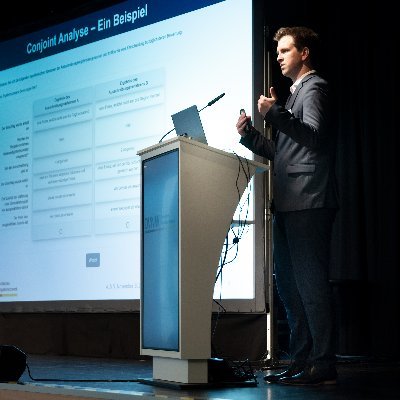
Philipp Heil
@philipp_heil1
Followers
84
Following
72
Media
0
Statuses
23
Postdoctoral Researcher @HECParis, interested in Behavioral Macroeconomics and Public Finance.
Munich
Joined October 2010
0
0
0
10/10 Takeaway: Households place real economic value on expert narratives. Narratives: ✅ are in high demand ✅ improve understanding ✅ shape beliefs ✅ complement, not substitute, numerical forecasts Policy communication should use clear explanations, not just numbers.
1
0
1
9/10 Narratives also affect spending beliefs: They make people less likely to say “now is a good time to spend,” especially on durable goods. Effects are amplified when combined with Fed forecasts. But: no effect on personal spending plans or policy preferences.
1
0
0
8/10 Narratives shape beliefs — but not numeric expectations. Narratives do not change recession probability estimates. But they strongly shift qualitative beliefs about recession drivers. They also increase understanding of macroeconomic mechanisms.
1
0
0
7/10 When given a choice between narratives: Most pick the consensus narrative, but pessimistic narratives also attract attention. Importantly, accuracy concerns dominate over motivated reasoning. Most people prefer the narrative they believe to be most informative — not the
1
0
2
6/10 Who pays for economic narratives? • Higher income → higher WTP • Women & more patient respondents → higher WTP • Older & more uncertain individuals → lower WTP Motives for acquisition are mainly intrinsic: people want to understand the economy, not just make money.
1
0
1
5/10 Main Finding: People are willing to pay a lot for narratives. Average WTP for an expert narrative = $4.23 WTP for a numerical Fed recession forecast = $3.61 That’s roughly the price of a Financial Times newspaper. Narratives are valued at least as much or even more than
1
0
0
4/10 We first collected recession narratives from experts: why they think recession risk is high. The dominant narrative: tight monetary policy in response to inflation. Other narratives: geopolitical risks, low consumer spending, etc. These expert narratives are then offered
1
0
0
3/10 We combine: 1. A comprehensive expert survey (160 U.S.-based academic economists) 2. A large-scale, nationally representative household survey (9,123 respondents) 3. An incentivized willingness-to-pay experiment The context: historically high U.S. recession probabilities in
1
0
0
2/10 Economic narratives — explanations of why the economy is doing what it’s doing — are everywhere in media and public debate. But: Most research so far focuses on the effects of narratives once people receive them. We ask a more fundamental question: Do households actually
1
0
1
📢New working paper: “The Demand for Economic Narratives” with @BlesseSebastian, Klaus Gründler & @henninghermes We study whether households actually demand and value economic narratives — and how these narratives shape beliefs and understanding. Thread following below👇 1/10
2
7
25
New CEPR Discussion Paper - DP20759 The Demand for Economic Narratives Sebastian Blesse @ifo_Institut @UniLeipzig, Klaus Gruendler @ifo_Institut @uni_kassel, Philipp Heil @ifo_Institut @HECParis, @henninghermes
https://t.co/3hUb6dcy6F
#CEPR_MG #CEPR_PoE #EconTwitter
2
4
17
#Ökonomen in Europa erwarten bis Jahresende deutlich höhere Zölle auf US-Importe. Das zeigt die internationale Umfrage #EconomicExpertsSurvey (EES). PM 👉 https://t.co/ErNu0eaSSy Umfrage 👉 https://t.co/zeAFEO7hDq
#ifoUmfrage
5
4
9
A big thank you to all participants of the KIZ Political Economy Workshop 2025 in Munich! 🙌 3 days of great discussions and interesting presentations on income & voting, female empowerment, economic history, taxation, and territorial reforms! @zew_en @uni_kassel @UniLeipzig
0
2
11
📢New WP! How do firms perceive the competitiveness of their business location and how does that shape their investment decisions? In a project with @BlesseSebastian, F. Buhlmann and @almostcertainly we study these questions in a firm survey experiment. Check out the thread👇
🚨 New IZA Working Paper out now! "Local Policy Misperceptions and Investment: Experimental Evidence from Firm Decision Makers“ by Sebastian Blesse, Florian Buhlmann, @philipp_heil1 , and @almostcertainly. A thread 🧵:
1
3
8
Wer noch mehr Informationen und Hintergründe zu den Daten haben möchte, kann dazu gerne in unserem @ifo_Institut Schnelldienstartikel nachlesen. https://t.co/WjgtG6B4LJ
0
0
0
Vielen Dank für die tolle Zusammenarbeit! @ifo_Institut
@zeitonline @infas360 @c_endt @juliustroeger @_David_Will @colorfuldata @M_Schlieben @_Jak_Bar
Grüne Kerne, schwarz-rote Ränder: Die Bruchlinien verlaufen in Deutschland nicht nur zwischen Stadt und Land, sondern mitten durch die Städte hindurch. Für unser Datenprojekt haben wir Deutschlands politische Landschaft neu kartiert. @zeitonline @ifo_Institut @infas_Institut
1
0
15



